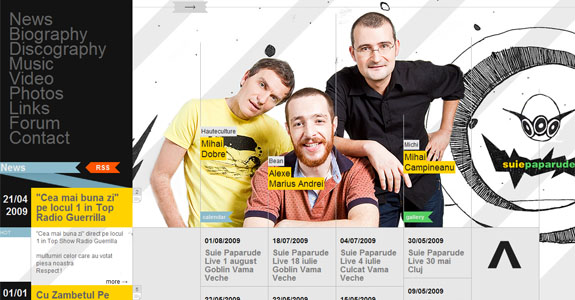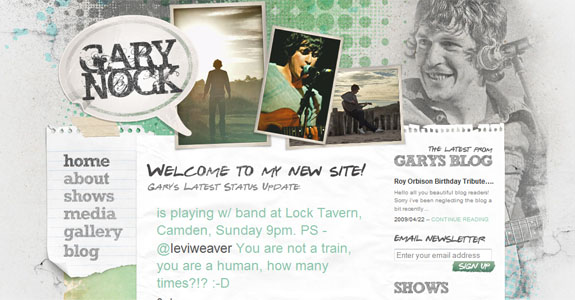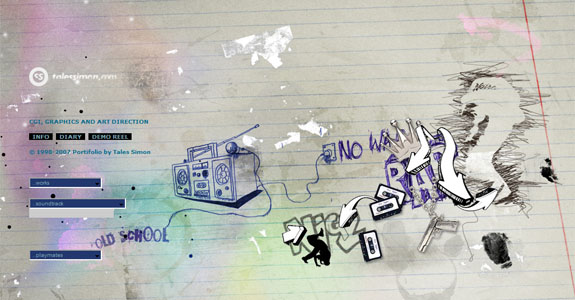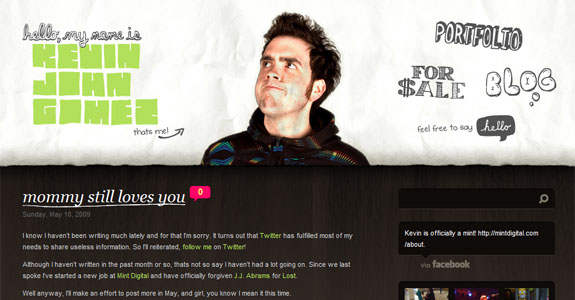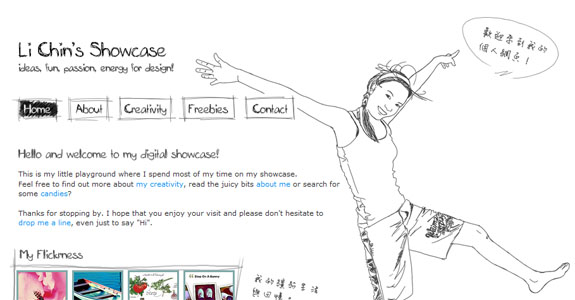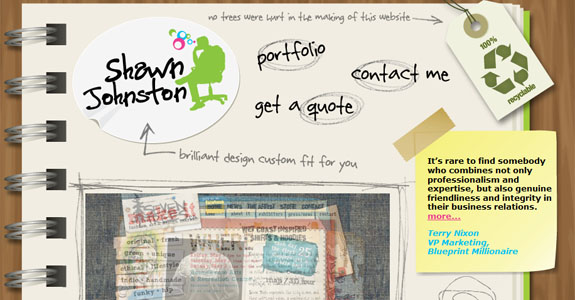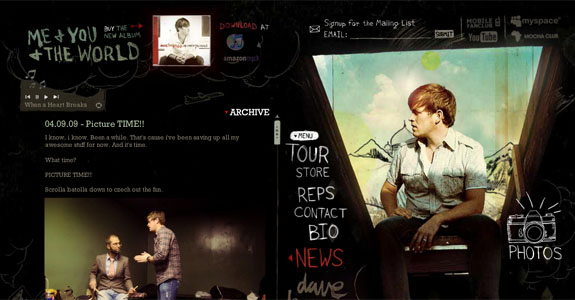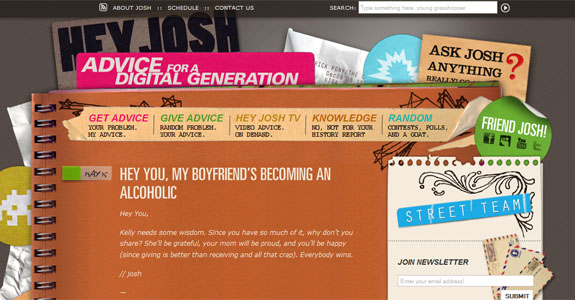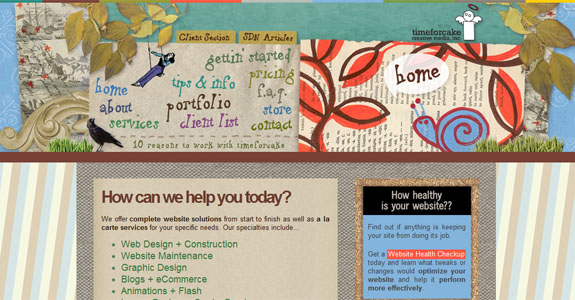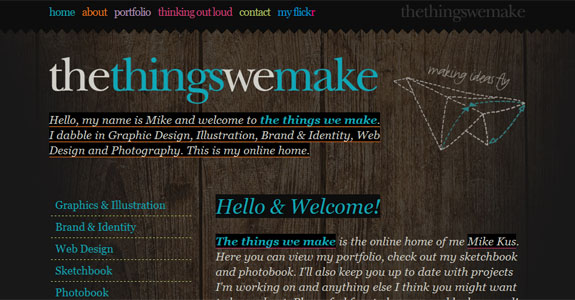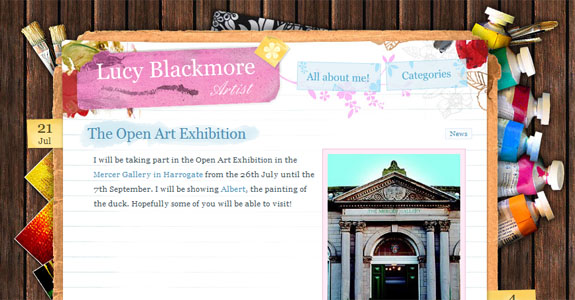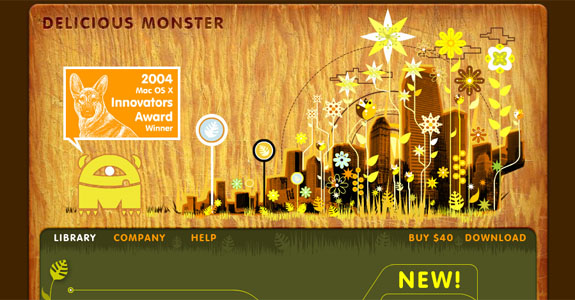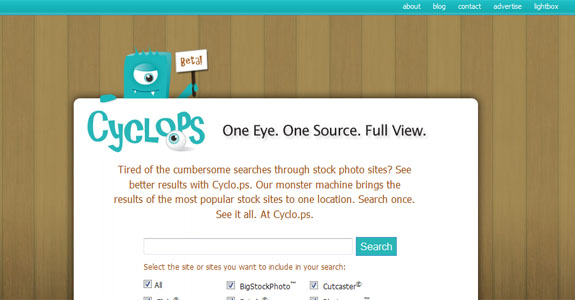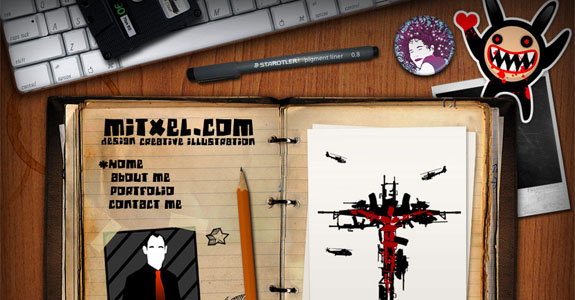You don’t like your life? Change it! Change your life for the better! Don’t have any clue on how to do it? Here’s a list of 100 ways in which you can improve your life. Feel free to add yours in the comments. This post is a response from a challenge I got from from Mike King in this great post 100 Ways To Be A Better Leader, which in turn got inspired by this one Tackle Any Issue With A List Of 100 , from Luciano Passuello. [Later edit: you may also be interested in this sequel 100 Ways To Improve Your Blog.]
Without further ado, let’s go.
1. Accept Your Mistakes
You’re human. We, humans, are making mistakes. Accept what you did wrong and try to do better next time. No need to punish yourself forever. In fact, accepting your mistakes is the only way to make them disappear.
2. Accept Your Friends Mistakes
Maybe you got hurt by somebody. Happens. Just accept it and deal with it. People are making mistakes and if you can accept that for yourself, accept it for your friends too. In the end, all you need from them is their love.
3. Create A New Habit
We’re doing a lot of stuff on autopilot. Try to integrate in this category new things you want to attract into your life. Habits are powerful. Harness their energy for your own good. Start by creating a habit in 15 days.
4. Build Self Discipline
Don’t wait for other people to impose discipline on you. Start early. Create your own discipline. Although it sounds a little bit harsh, self discipline is a facilitator for many things in your life. It’s hard to get but great to have.
5. Make New Friends
Reach out. Don’t be afraid. Establish new contacts. The worst thing that may happen to you is to be rejected. Well, if that’s the case, move on. The reward of having true, long-lasting friendship is worth all the potential rejection.
6. Get A New Job
Shaking your comfort zone will often create a lot of value in your life. If you’re not satisfied with your job, just get a new one. The pitfall of not having money for a limited period of time is temporary, get over it.
7. Start A New Diet
You are, in a vast proportion, what you eat. Trying a new diet would often be the only needed change for a dramatic boost of your health and energy. Don’t necessarily have to be raw food, or even vegetarian, whatever works for you.
8. Keep A Journal
Write down you feelings, your ideas, your goals, your activity. Journaling is by far one of the most useful things I’ve done to change my life for the best. It works in such a silent, yet effective way. All you need is pen and paper.
9. Create And Keep A Morning Phrase
Whatever you say to yourself in the morning, it will most likely come true during the day. Why not taking advantage of it? Create a simple morning phrase and say it to yourself first thing in the morning. Is that simple.
10. Travel Far Away From Your Home
Traveling long distance is incredibly rewarding. It’s so exciting and full with unknown events. I only recently started to travel really far away from my home, but I do wonder how could I ever made it until now without this.
11. Learn To Take Risks
Your life may be so boring and fade because… err, you made it like this? When was the last time your tried something really difficult? When was the last time you challenged the odds doing something risky? Do it now.
12. Start Your Own Business
Be your own boss. Work your own hours. I know, it sounds so shallow, for you, who hate your job but still have to stay there because of that mortgage. Well, unless you make the first step, nothing is going to change. That’s for sure.
13. Change Your Work Space
Clean up your desk. Re-arrange furniture. Add some color to that space. Make the place where you work really enjoyable. So enjoyable that work there won’t be perceived as work anymore. It will be something you love to do.
14. Learn A New Language
Challenge your mind. Constantly. If you’re going to do number 10, you’re going to learn some new languages too. From my experience, learning a new language is a fantastic mind opener. Sometimes you don’t even have to travel there.
15. Find Reasons To Agree
Rather than disagree. We have this mindset of competition which makes constantly arguing over things. Well, stop that. You don’t have to force yourself into agreement, if it’s not the case, just trying to find some reasons will be enough.
16. Pay Yourself First
You can’t give something if you don’t have it. You can’t spread light onto others if you don’t have light from within. You can’t give wealth to others if you don’t have it for yourself first. Make yourself a service and pay yourself first.
17. Wake Up Early
This is not a habit, this is a lifestyle. Don’t just wake up early without a purpose. Be early. Be there before others. Look for opportunities and embrace them. Waking up early means keeping your eye open to every available opportunity.
18. Train Your Focus
Your focus is in fact your reality. Use it wisely. Train it constantly for it will enhance your reality in ways you never imagined. Keep your focus sharp as a razor blade and be prepared to experience life in fantastic shapes and colors.
19. Start A Blog
On whatever topic you want. Not only it will give you the opportunity to create something new and valuable but it will also bring new people into your life. Blogging is far more than a hype, is a personal development tool. A very good one.
20. Write An Ebook
You may think you don’t have a talent, but that’s completely wrong. And the easiest way to prove it wrong is to start writing an ebook. Any ebook. You pick the topic. It might be something you know or want to learn about. Write it. It’s fun.
21. Be Better, Not Perfect
Striving too much for perfection will ruin your life. It will wipe out all those little imperfections which are making you… human. Being better, on the other side, is rewarding. Look back at the yesterday you and just say: I’m better!
22. Stop Self Sabotage
You’ll be surprised by how much of a burden you can be to yourself. You are literally self sabotaging. Most of the time, unconsciously. If you have a long history of failure behind, that could mean you’ve become your worst enemy. Stop it.
23. Find Reasons To Love Your Life
Maybe life wasn’t fair with you. Yes, I know, I’ve been there: life is never fair. But it’s fantastic. It’s unique, unrepeatable, one of a kind, beautiful, simple, challenging, sweet, hard… Just take a step back and find reasons to love your life.
24. Try Something New
Maybe you’re sad because you’re bored. Have you ever thought about that? Just reach out and try something completely new. Go for a challenge, learn a new sport, pick a different restaurant or go for a comedy movie (if you’re the drama type). Just try it.
25. Avoid Fighting
Fighting is the biggest energy leak of your being. Trying to prove another guy wrong is so against your true nature. You’re here to acknowledge life’s wonders, not to prove anybody’s wrong. They’re not wrong, just have different opinions. And that’s part of life.
26. Stop Wasting Your Power
Are you doing something that you think you shouldn’t be doing right now? Well, that’s wasted power. That’s meaningless stuff promoted to the honor of being a part of your life. How long are you going to approve this? Why wasting power?
27. Learn To Ignore
I think they should be teaching this one in schools. We’re so focused on so many topics and think we have to do so many stuff, that our life is literally clogged with stuff. It’s good to do stuff, but learning to ignore stuff is much better.
28. Experiment Gratitude
When was the last time you said “thank you”? With all your heart? Everybody knows that an attitude of gratitude is the key to success, but almost nobody practices it. Well, start by experience gratitude first, and take it from there.
29. Recycle Your Aggression
Don’t throw it away, recycle it! Use it for something you really want! Call out those wild forces inside of you and put them to work. Aggression is part of your being, so don’t try to reject it, because it will only grow stronger. Recycle your aggression.
30. Release Your Guardians
Don’t touch that! Don’t eat that! Don’t go for that opportunity! Those are the sentences you hear when going for something you really want. Those are yourguardians, your mental constructs made to protect you. Release them, you’ll be much better off.
31. Clean Up Your House
It’s fun. And it’s good for you. Make a habit out of cleaning up your house with joy and happiness. What’s outside is a mirror of what’s inside. If your house is a mess, probably your internal life is a disaster. Neat that stuff, it’s easy.
32. Write A Personal Mission Statement
You’re here with a reason. No matter how small you feel now, how insignificant others may made you feel, you have a purpose. Take the time to write your personal mission statement. It will bring light and direction into your life.
33. Dissolve Negative Opinions About Yourself
Whatever you think you may do, it’s half of what you can really do. And that’s because you have so many negative opinions about yourself. You can solve them. Just accept the fact that you have them and then start working on them.
34. Build Different Skills
Don’t stop learning. Don’t remain stuck in a single career, it’s boring and limiting. Learndifferent skills, possibly from completely unrelated fields. You never know when life will ask you to use them. Besides, it’s a lot of fun.
35. Manage Your Time As You Manage Your Money
Have you ever thought what would be if you would manage your time the same way you manage your money? Just give it a try. See where you spend most of your time, what the return of investment is and how rich are you in time.
36. Exercise
You don’t have to break the world record, or something. Just make sure you exercise constantly. It will make your body healthier and your mind clearer. It’s also one of the simplest and most affordable ways to improve your life.
37. Be A Parent
Having kids doesn’t necessarily means you’re a parent, and I know that very well. Being a parent will surely change your life forever: filling it with unconditional, life lasting love, care and warm feelings. You’ll live in love. And learn.
38. Throw Away One Object A Day From Your House
Maybe your life is breathing so hard just because it’s suffocated by objects. Learn to let them go. You may donate them, give to charity or simply throw them away, but don’t let the clutter stay in your way. You’re not the objects you have.
39. Read A Book Per Week
Or, alternatively, a fine selection of blogs. That will keep your mind alert and your focus steady. Reading is like good food for your brain, without it, it will go lazy, obese and unresponsive. But with the proper food it can become your best friend.
40. Start A Monthly Challenge
Being it physical, mental or social. Intend to acquire something new in your life in 30 days. Improve your health using new methods, or your relationships by starting new things together. Make it count. And count on it.
41. Call An Old Friend
It’s enlightening to meet somebody you haven’t talk to in the last years. Go right now and call an old friend, or a relative. It will bring up memories and it will create new opportunities. Don’t let the dust settle on your relationships.
42. Follow A Coincidence
Well, there aren’t any coincidences, I lied. Everything has a purpose. If you witness something which may seem like a coincidence, then you’re very lucky, you just got a sign. Follow it with trust, it will lead you well.
43. Play A Game
Any game. Just play. Like a child. Allow yourself to do something just for fun, without any goals, pressures or deadlines. Will make you understand that everything is a game. Sometimes a little bit harder, but still a game..
44. Forgive Somebody Out Of The Blue
Don’t hold that grudge for that past insult. Grudges are heavy and tend to make the take off for a new life a little bit difficult. The longer you hold that grudge, the more difficult the take off will be. Forgiveness will lift you off.
45. Stop Solving The Wrong Problems
You are not here to witness the bad things in your life. Nor the performance in itself. You are here to enjoy a journey. To become aware, To grow. So, stop solving the wrong problem and focus on what really matters.
46. Make Peace With An Old Enemy
That’s more than forgiveness, that’s the actual process of reversing a situation. Make peace with somebody. Turn it into your friend. I’m not saying this is easy, I know it first hand. But I also know it works. Enemies count down, friends count up.
47. Make A Promise To A Close Person And Keep It
It doesn’t have to be something big. It doesn’t have to be for someone special. It doesn’t have to be difficult also. But it has to be a commitment to somebody. Just reach out, make a promise, keep it and then enjoy the feeling after.
48. Break Up With A Person You Don’t Really Like
Maybe you’re friend with somebody just by habit, chemistry being dead for a long time now. Just break it up. Tell him. Ok, let’s unfriend us, this will not work. It will bring up something you thought you lost it long ago: courage.
49. Get A Thing You Wanted For A Long Time
But you didn’t had time or money to get it. Just go out and get it. Not only it will boost your self-respect, but it will also free your desire channel, which may be a little bit clogged by having one and only one desire for such a long time.
50. Stop Being Judgemental
With others AND with you. Excessive criticism will kill your enthusiasm. And if you think this post is something you shouldn’t read in the first place, then, my friend, you really are judgemental. Lighten up. Accept life as it is.
51. Change Your Wardrobe
You don’t know how much are you tied to what you wear. If you’re on the gray loving side, put some color in your clothes. If you’re on the black and white, try some gradients. Of course, your clothes are not you. Hence, they’re so easy to change, right?
52. Smile At Least 10 Times A Day
And I mean it, start to count that. Smiling is a sign of honesty and power. Everybody can cry over a disaster but only the most powerful can take bitterness with a smile. Exercise that power. And then try to go for 20 times a day.
53. Burn Some Old Memories
Maybe the notebook from your 7th grade? Maybe the teenage dumb poetry you wrote? Whatever it might be, break up. It might be difficult, but it might also be a sign that you’re so attached to the past that you can’t advance in your life anymore.
54. Plant A Tree
Or take care of a flower. Do it for at least several months. It will give you a sense of potential. Seeing that tree or that flower growing will make your self-confidence go up. If a flower can make it, why can’t I? Of course you can, now do it!
55. Move To Another Town Or Country
Maybe it’s time to change the environment? Take the plunge, move over. Pick another town or even another country. Like all the good stuff, it might be pretty difficult in the beginning, but you can bet it would shake everything really good!
56. Join A New Group
Go to a bikers meeting. Or, if you’re not a biker, to a toastmaster meeting. Join a group and see how you fit in. It will help if the group will be focused on some of your passions, of course. It will reveal a lot about your social skills.
57. Stop Watching TV
Television evolved a lot from the balanced news provider it was in the beginning up to the current manipulating tool. Just stop watching it for a week. And then for a month. Meanwhile, assess your psychological progress. You may be amazed.
58. Start A Totally Unexpected Hobby
Start making trains out of matches. Raise cobras. Put tiny vessels into tiny bottles. Do whatever it takes to move your mind from your problems for a while. And if you can create something nice in the process, why not doing it?
59. Randomly Hug A Stranger On The Street
Ok, this might be a little bit dangerous, but only if you think at it. If you’re doing it, chances are that you’re going to get your hug back. It will also help raising your adrenaline up to levels you never had for a very long time.
60. Set Up A Surprise Party
For your or for a friend. It’s always good for your mood, even if – or especially if – you’re down. Do a thematic one, invite friends and tell them to bring their friends. And then expect to meet new, wonderful persons. And of course, have fun.
61. Go Hiking
Do it for at least one week-end. Nature is more powerful than our human created environment. We don’t know how to channel the energy into our artificial habitats. If you want to recharge, go outside and stay in connection with the wilderness.
62. Get A Pet
Whatever works for you, a bird, a guinea pig, a dog or a cat. It will keep you alert and it will cheer you up when you’re down. Taking care of a pet is also easier if you’re overwhelmed with human interaction. Even from a pet, love is still love.
63. Write A Thank You Letter
You can send it or not, the real catch is to write it. Pick someone who helped you in the past. Start writing the letter and say everything you want to say to that person. It will make you understand what are you really grateful for in your life.
64. Meditate Daily
It’s the easiest thing you can do. True mediation acts like a mind emptier, leaving you open to the whole flow of the sensations and experiences you would otherwise ignore. You don’t even need a complicated technique, meditate as you see fit.
65. Say Something Nice To Somebody
Just like that. Out of the blue. Pick an unknown person and say something nice. After the initial surprise you’ll be amazed by the unmasked joy and gratitude they’re expressing. Admit it: you would like that too, isn’t it?
66. Say Something Nice To You
Ok, but if nobody is telling you nice things, why not start this yourself? Do it in whatever form you think it’s appropriate: send yourself emails, write in your calendar or leave yourself nice postits on the desk. With something nice just for you.
67. When I Doubt, Improvise
Being so scared for not knowing the answer, so nervouse that you may screw thins up… I know the feeling, I’ve been there too. Just go with the flow. Improvise. It will be so good for your unconscious mind. The real answer will be surprising.
68. Don’t Argue, Win Or Lose
This goes hand in hand with avoiding the fight, but it’s a little bit different. If you get caught in an argument, just accept that you can have only two outcomes from it: win or lose. Settle with one and just move on.
69. Stop Faking Your Life
It’s so easy to get caught in a flow of fakes. Society wants us to politely lie and you need to lie sometimes. Just stop it. Being authentic is the best thing you can do. No need to hide your sorrow, nor your joy. They’re both part of life.
70. Define Goals
Again, that goes hand in hand with writing a personal mission but it’s more than that. It’s the habit of clearly deciding – and, subsequently, describing – where you want to go. Do you have a goal? A passion, maybe? Go for it! And be verbose.
71. Help Others
Reach out and try to see if you can help others. You don’t have to be a Samaritan, just go out there and support somebody. The biggest trick of helping is really surprising: although it seems you’re giving, you’re in fact receiving a lot more.
72. Go Social
Mingle, interact, go out. Get used to meet new people. Make this a habit and you’ll soon get used to do new things too. The goal is not to be the best networker in the world, but to be connected to as many energy sources as you can get.
73. Spend Some Time Alone
Subsequently, make sure you set aside enough time for your own. You don’t necessarily need to recharge, but you need this time in order to get a new perspective. Stop for a while and look around. Where are you? Where do you want to be?
74. Fix Something By Yourself
Go fix a broken window, or a scratch on your car. Don’t call for a specialist, get involved, see how you can have an impact on things around you. Work with your hands, prepare to sweat. It will instantly make you feel better.
75. Create Value
Make things that others need too. Make something useful. Don’t follow blind or outdated commitments, go for what really makes a change around you. Creating value is the core of your activity here and the only thing you really have to strive for.
76. Do A Random Act Of Kindness
Doesn’t have to be in the form of a nice compliment this time. You don’t even need to communicate it to the target person. Just do an incognito service to someone. See how this makes you feel. Think how many times you received that.
77. One More Second
Create the habit of looking at things for one more second. Spend one more second before taking an important decision. Delay something. Time will follow your intention and open some unexpected window for you. Slow it down a little.
78. Understand What People Want From You
What you can do is not always what people want from you. Clearing that confusion alone could bring an immense relief to your life. You don’t have to immediately provide what they’re wanting, but if you do, you may have some big surprises.
79. Break An Old Bad Habit
Breaking a bad habit is difficult. But breaking an old bad habit will free an incredible amount of time into your life. Quit smoking or stop talking on the phone for hours. Whatever you break, it will change your life for the best.
80. Stop Complaining
Complaining is like an open invitation for troubles. The more you complain about something, the more of that something you invite into your life. Cut it out. You don’t get any comfort out of complaining, only troubles.
81. Reject What You Don’t Want
It’s so simple, yet so underrated. Society wants us to complain even when we don’t really like stuff. Like forcing us to smile when we don’t find it funny. Allow yourself to walk away from something you don’t like. Just do it!
82. Being Is Better Than Having
Too much and too often we shape our life’s fulfillment degree to the amount we possess. The fundamental mistake. If you’re doing it, stop it right now. You’re not what you’re having. Being is so much better than having.
83. Listen To Your Critics
This one might be difficult in the beginning but once you get used to it it’s fantastic. You may find out a lot of stuff about yourself that you didn’t know about. You think you are one kind of person, but others may disagree.
84. Don’t Take It Personally
Never. Your world is shaped by your reaction to things, not by the things themselves. Don’t get upset, don’t think that somebody knows you enough to make right assumptions about you. Acknowledge and move on.
85. Laugh
This time is not about smiling. It’s about laughing. Don’t you ever miss another opportunity to laugh. Especially at yourself. The longer your laughing sessions, the shorter your misery ones. Looks like a nice deal, isn’t it?
86. Go With Passion
Don’t let your rational mind stand in the way of your passion. If you found – or at least felt, even occasionally – something that thrills you, you’re there. You don’t need a confirmation on this from anybody. Go with your passion.
87. Trust Your Emotions
Don’t underestimate your emotions. Or overestimate them. Your emotions are your feed-back system and for that they are very important. Trying to ignore your emotions is like depriving yourself from lights in a car running in the middle of the night.
88. Live It Like A Holiday
Ever observed how nice you feel during your holiday? How light, joyful and authentic? Everything is just wonderful. Well, you are on a continuous holiday here. It starts with your birth and end with your death. Live it like a holiday.
89. Make A Story Out Of It
Do you like a good story? I love it. Make everything in your life story-worthwhile. Make it as it would be a fantastic journey and you will be at all time the observer, the hero and the narrator. Create the story of your life.
90. Stop Being A Follower
Admiring is nice. But being admired is even better. Stop trying to fit in other people’s shoes. Find your own path. If that means breaking up completely your lifestyle, so be it. If you are “like” somebody else you can’t be “like” yourself anymore.
91. Watch Your Beliefs
Your beliefs are not you. But they are shaping your life constantly. You have the power to change them at any point in your existence. But in order to do that, you must first start to observe them, to isolate them, to accept them.
92. Stop Lying
To others and to yourself. Although it might ease a complicated situation, a lie is not good in the long run. The trick is that if you’re telling a lie you’re altering your reality. And a distorted reality will be impossible to handle.
93. Stop Reacting To Stuff
And start acting on stuff. Initiate things. Start projects. Predict situations and be there before the hurricane hits. Reacting to stuff is a victim paradigm. Stop being a victim and start acting. Create your life instead of being the creation of others.
94. Live Today
Not yesterday, not tomorrow. Go for what you can do today and leave yesterday behind for good. It’s not here anymore. And tomorrow doesn’t even exist yet, so why bother. All you have is today. Don’t waste it.
95. Expect The Unexpected
If there’s something unusual that happens to you, go for it. The unexpected is a signal of an opportunity. It will not always be nice, this unexpected, but whenever it’s around, magical things are happening. Wait for it. Praise for it.
96. Enjoy
Like being in joy. Like giving permission to yourself to extract joy from any situation you’re in. Even if it’s bad. Or especially if it’s bad. Joy is everywhere, you just have to let it manifest through you. Don’t resist joy. Don’t reject it.
97. Make Your Own Rules
And stick with them. Go for what works for you, not the others. Go for what you want, not the others. Including me. Make your own system and be proud of it. You may upset some people in the process, but hey, that’s life.
98. Love
Unconditionally. Totally. Constantly. Restlessly. Love is the only glue that keeps your life running. You were born out of love and you carry it deep down in your being. Love is never about the others, it’s about you.
99. Get Rid Of Labels
Things are what they are. Don’t use labels anymore, use directly the things. Your notion of “right” and “wrong” are nothing but labels. In a different country your “right” might be “wrong”. Don’t charge yourself with this unneeded burden.
100. No Regrets
Regretting something is another form of not accepting reality. What you can do about it now? It’s gone. It doesn’t exist anymore. Focus on what you can change: your present moment. Not yesterday, not tomorrow. Now. Live now.
Article posted on http://www.dragosroua.com

![]()



















 The famous saying goes, “Practice makes perfect”. Make a cool tutorial with an effect that you know. Kill two birds with one stone and use the pieces that you make for your portfolio and polish your skills at the same time. It’s a great way to get away from work that you have from clients and have some fun. Also, more often than not, the pieces that you make for yourself will be your best work. Why? Because you know what looks nice and you have no one else to please other than yourself.
The famous saying goes, “Practice makes perfect”. Make a cool tutorial with an effect that you know. Kill two birds with one stone and use the pieces that you make for your portfolio and polish your skills at the same time. It’s a great way to get away from work that you have from clients and have some fun. Also, more often than not, the pieces that you make for yourself will be your best work. Why? Because you know what looks nice and you have no one else to please other than yourself.
